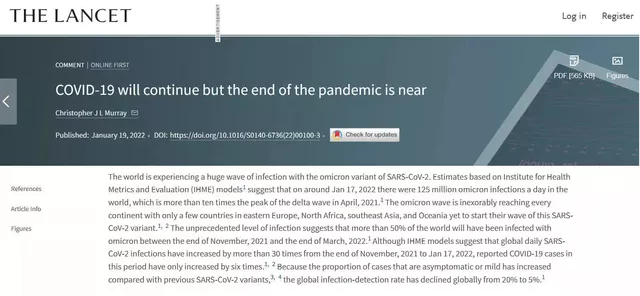The Lancet: COVID-19 pandemic will end in March?
- Aspirin: Study Finds Greater Benefits for These Colorectal Cancer Patients
- Cancer Can Occur Without Genetic Mutations?
- Statins Lower Blood Lipids: How Long is a Course?
- Warning: Smartwatch Blood Sugar Measurement Deemed Dangerous
- Mifepristone: A Safe and Effective Abortion Option Amidst Controversy
- Asbestos Detected in Buildings Damaged in Ukraine: Analyzed by Japanese Company
The Lancet: COVID-19 pandemic will end in March?
- Red Yeast Rice Scare Grips Japan: Over 114 Hospitalized and 5 Deaths
- Long COVID Brain Fog: Blood-Brain Barrier Damage and Persistent Inflammation
- FDA has mandated a top-level black box warning for all marketed CAR-T therapies
- Can people with high blood pressure eat peanuts?
- What is the difference between dopamine and dobutamine?
- How long can the patient live after heart stent surgery?
The Lancet: COVID-19 pandemic will end in March?
The COVID-19 global pandemic will end! Critical time node: end of March.
On January 19, local time, “The Lancet” published a blockbuster online article “COVID-19 will continue but the end of the pandemic is near”. Chris Murray, Institute for Health Metrics and Evaluation, University of Washington, believes that the new coronavirus will continue in the future. Continue to exist, but no longer in a pandemic state, the contagion will be more manageable.

According to Worldometers real-time statistics, as of 2:30pm Pacific time on January 20, 2022, a total of 342,446,503 COVID-19 pneumonia cases and 5,591,385 deaths have been confirmed globally.
Two years ago today, that is, on January 21, 2020, the China National Health and Medical Commission began to report the national COVID-19 pneumonia epidemic situation daily.
On January 30, 2020, the World Health Organization (WHO) declared the novel coronavirus outbreak a Public Health Emergency of International Concern (PHEIC); constitute a global “pandemic”. Two years later, how far is the global COVID-19 pandemic from being over?
Based on the Institute for Health Metrics and Evaluation (IHME) model, around January 17, 2022, there will be 125 million daily Omicron infections globally, more than 10 times the delta peak in April 2021.
Murray pointed out that the global COVID-19 pandemic is likely to end in the near future, and the marker time point is March 2022.
According to the current epidemic situation, 50% of the world’s population will be infected with Omicron mutants.
The key to fully understanding the health burden of Omicron is the proportion of asymptomatic infections, the study said. Despite a more than 30-fold increase in daily COVID-19 infections globally, reported COVID-19 cases increased only 6-fold during this period.
The global infection detection rate dropped from 20% to 5% due to an increase in the proportion of asymptomatic or mild cases compared to previous COVID-19 variants.
40% of infections in previously confirmed cases of COVID-19 variants were asymptomatic. Evidence suggests that the proportion of asymptomatic infections in Omicron is much higher, possibly as high as 80%-90%.
Murray pointed out that with the continued increase in COVID-19 vaccinations, the advancement of third doses in many countries, and the high level of acquired immunity to infection, global COVID-19 immunity should be at an unprecedented level for some time.
In the coming months, the spread of the new coronavirus around the world will usher in lower levels.
The Lancet: COVID-19 pandemic will end in March?
(source:internet, reference only)
Disclaimer of medicaltrend.org
Important Note: The information provided is for informational purposes only and should not be considered as medical advice.



